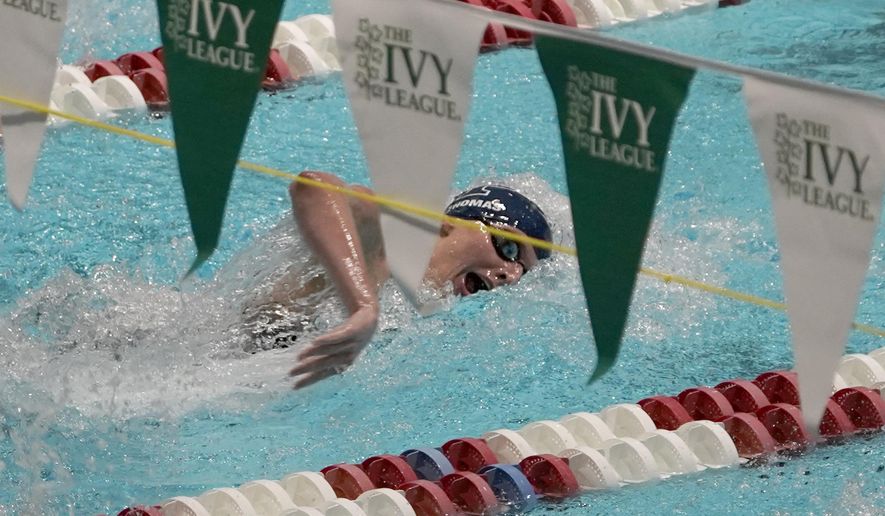The international swimming authority announced Sunday that post-pubescent male-born swimmers will be banned from female races, dousing transgender athlete Lia Thomas’s hopes of competing against women at the Olympics.
The International Swimming Federation (FINA) said that 71.5% of federation members voted to adopt a revised “gender inclusion policy” after reviewing the conclusions of a working group established in November to examine the scientific and human-rights issues associated with transgender swimmers.
“We have to protect the rights of our athletes to compete, but we also have to protect competitive fairness at our events, especially the women’s category at FINA competitions,” said FINA President Husain Al-Musallam in a statement.
The 24-page policy, which takes effect Monday, allows male-to-female swimmers to compete in women’s events “if they can establish to FINA’s comfortable satisfaction that they have not experienced any part of male puberty beyond Tanner Stage 2 or before age 12, whichever is later.”
In addition, swimmers in women’s competitions whose testosterone in serum tests above 2.5 nanomoles per liter may be subject to sanctions, including being disqualified retroactively and ruled ineligible for a certain period, depending on whether the infraction was intentional or unintentional.
FINA also said that male-to-female swimmers are welcome to continue keeping against men, and that female-to-male swimmers may compete in the women’s category as long as they are not taking male hormones.
The international swimming body also said it would establish a working group aimed at launching an “open competition” category for athletes “who do not meet the applicable criteria for the men’s category or the women’s category.”
James Pearce, spokesperson for Mr. Al-Musallam, said the policy was not intended to incentivize athletes to undergo gender transitions before puberty.
“This is not saying that people are encouraged to transition by the age of 12. It’s what the scientists are saying, that if you transition after the start of puberty, you have an advantage, which is unfair,” Pearce told reporters.
He also said that there are no male-born swimmers who identify as female competing in elite levels of women’s swimming.
Concern about transgender athletes soared in March when Thomas became the first biological male to win an NCAA Division I women’s championship. Thomas had complied with NCAA rules requiring at least a year of testosterone suppression before competing as a woman.
Thomas, who swam for three years on the men’s side without notable success before joining the women’s team, has expressed interest in competing in the Olympic trials.
#LiaThomas will not race against women after FINA rule on transgender athleteshttps://t.co/g3Ef1v7xzM
— OutKick (@Outkick) June 19, 2022
British biologist Emma Hilton, a critic of allowing biological males in women’s sports, praised the policy change, tweeting “FINA [has] come through.”
“No male who has experienced any part of male puberty is eligible for female categories,” she said.
Former British Olympic swimmer Sharron Davies tweeted that “I can’t tell you how proud I am of my sport @fina & @fina_president for doing the science, asking the athletes/coaches and standing up for fair sport for females.”
“Swimming will always welcome everyone no matter how you identify but fairness is the cornerstone of sport,” she said.
Fair Play for Women also cheered the decision, saying that the “international federations for swimming and rugby now reserve female teams for females only. We now need to see the U.K. governing bodies do the same.”
Pushing back was the Human Rights Campaign, America’s largest LGBTQ advocacy group, which condemned the policy change as “discriminatory” and “a blatant attack on transgender athletes.”
The HRC pointed out that several red states have moved to prohibit minors from undergoing gender transition treatment, including hormones and puberty blockers.
“It requires that transgender swimmers complete their transition by the age of 12 — an unrealistic and effectively impossible requirement especially as some states, including Alabama and Arkansas, are attempting to ban transgender youth from accessing the very same age-appropriate, medically necessary gender-affirming care that would allow them to comply with this policy,” the HRC said.
Transgender activist Charlotte Clymer called the policy change “horrific.”
“FINA has chosen to disregard science and bow to political pressure brought about by vicious anti-trans propaganda,” Clymer tweeted. “No young trans woman would meet this criteria without access to proper health care, which, itself, is being banned in many places. Ludicrous.”
Thomas insisted last month that male-born swimmers have not threatened women’s sports, in part because “trans women are women.”
“Trans women competing in women’s sports does not threaten women’s sports as a whole,” Thomas told ESPN. “Trans women are a very small minority of all athletes. The NCAA rules regarding trans women competing in women’s sports have been around for 10-plus years. And we haven’t seen any massive wave of trans women dominating.”
• Valerie Richardson can be reached at vrichardson@washingtontimes.com.




Please read our comment policy before commenting.